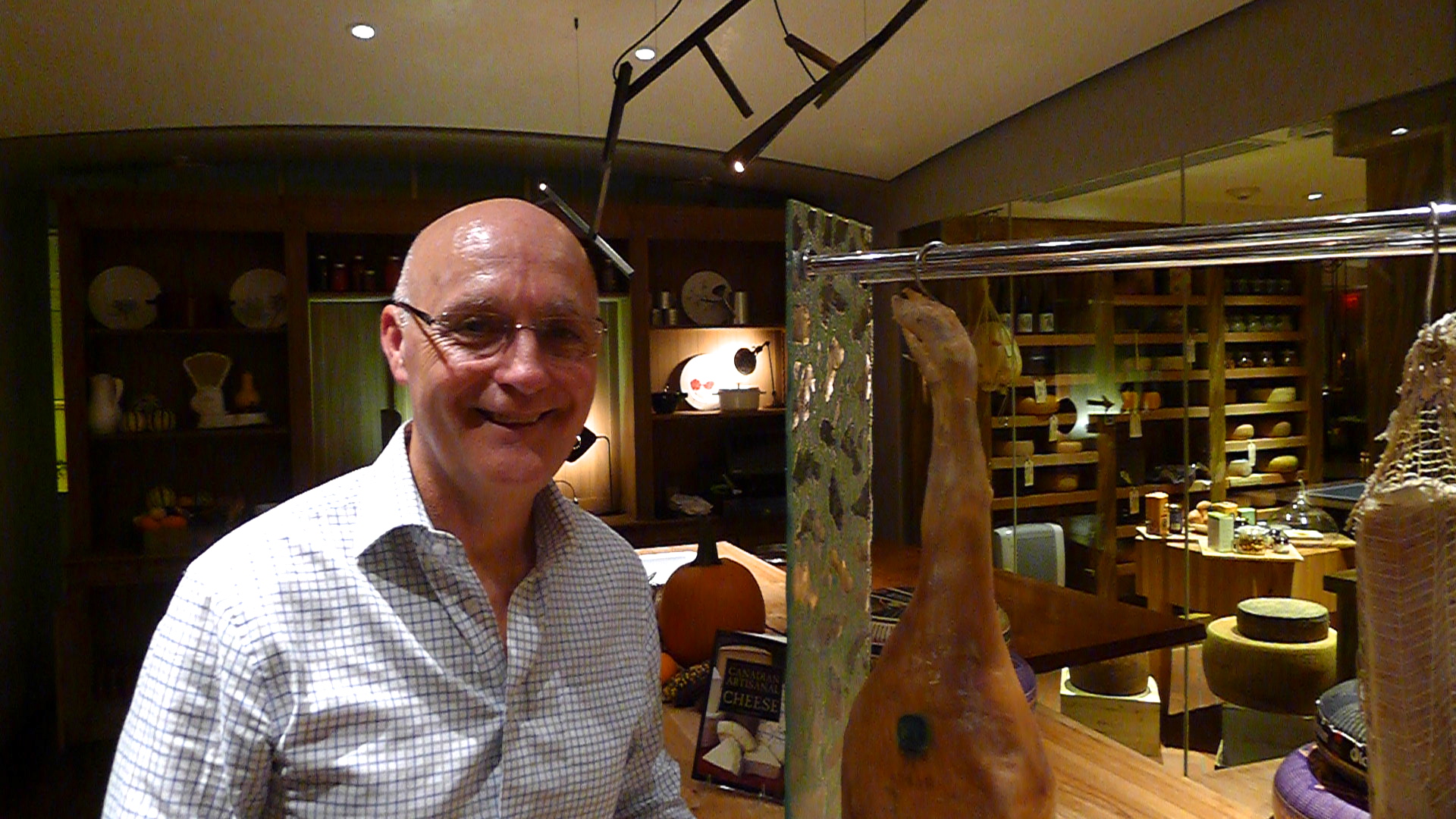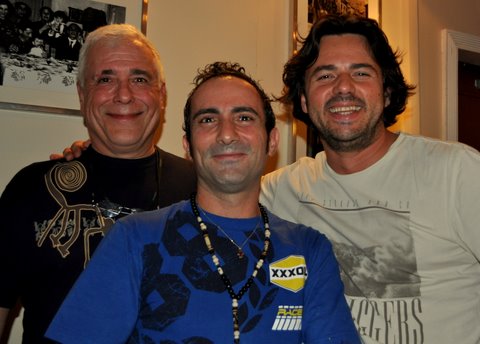
The indomitable Giles Coren is the restaurant critic for the Times of London newspaper, and so enjoys renown among the chattering classes of Great Britain and strikes fear into the hearts of aspiring restauranteurs in that country. Coren is also a broadcaster, and he was in Toronto last week to shoot and promote his upcoming television program Million Dollar Critic. The premise of the show, produced by Temple Street Productions to be broadcast on Corus’ W Network and BBC America starting August 21, is that the famous reviewer will visit restaurants in Toronto, Quebec City, St. John’s Newfoundland, and three other cities in the United States, all the while giving commentary to the camera. The “best” restaurant that he visits is rewarded with a written review in a local newspaper (like the Toronto Star) and other media, the publicity value of which is ostensibly worth “a million dollars”. Coren drily noted to me that being on TV isn’t so bad for the participants either.
While Coren’s restaurant writing has a reputation for rewarding disappointment with cruelty, he’s a remarkably warm, charming and funny man in person. When I met him on a cattle call at a photographer’s studio in the west end of the city, the first thing he said was how odd it was to be on the opposite side of the table for this kind of media interaction.
The interview below has been edited for clarity, and I have obscured the names of the restaurants discussed at the request of Million Dollar Critic’s producers (and also because it’s more fun to guess).
INTERVIEW
Good Food Revolution: What kind of restaurants in Toronto have you been going to?
Giles Coren: We’ve been to a nice spread of restaurants. It’s not how I go about reviewing restaurants, for instance, as a critic for a newspaper in London. I always try and go to the best, new places. I’m always trying not to do a bum review and find the best new food. But here [shooting Million Dollar Critic] were looking for good ones, but I don’t want to go to obviously good ones, or the ones where there’s a well oiled organization. So many restaurants, after they do well, become a chain and that’s not the human interest story for me. This show is not about food, it’s about restaurants and people through restaurants.
I’m not that interested in the cooking. We film in the kitchen and talk to the kitchen staff and chefs, but I don’t talk to them about technique: did you seal it? Did you use the sous-vide? Did you grill it first, or did you just brown it after? Or, where do you get your potatoes from? There’s enough of that on the TV. I want to know who’s in the restaurants: the waiting staff and the people who are eating in there. What [the restaurant] has done for the area, and what it says about the city.
So, we’ve had a broad pick. We went to a Pakistani take-away place. So, that represents one kind of a thing.
GFR: You mean taxi drivers and plastic cafeteria trays with styrofoam plates?
GC: Yes! I think they thought it was funny to get an upscale restaurant critic, in his hand made suits coming in, you know? But I love that kind of thing, too.
And then from there we went to [a well established expensive Italian restaurant] with its 100 page wine list, and everyone’s called Tony. It’s “Tony, Tony, Tony” and they’re all there and it’s all a bit of a throwback to the 1980s. But they cook perfectly nice food.
So, we go upscale, we go take-away, and we go hipster, obviously, because Canada seems to be a place where for some reason everyone’s a hipster. Is it because it’s a place that was naturally geared up with check shirts and beards? Canada was a place that was just so ready for hipsters. There just everywhere; and lovely and great.
We went to a [small, recently opened restaurant on a gentrifying stretch of Queen Street] last night. And it was all tattoos and those earrings, but with carefully tailored tweed suits and monocles and handlebar mustaches.
GFR: That sounds like your Edwardian show.
GC: Yes! I know! I think that’s what started hipsterdom, was my Edwardian show.
I mean, I like hipsters. They’re great for older fellows like us because you don’t feel as old. When 23 year old kids are dressed in track suits and trainers, and all buff, you feel like a bit of an git. But, if they’ve all got facial hair and tweed waistcoats and a monocle, then it’s fine. And I think that the hipster girls (which I really don’t understand) like hipster boys so they probably like older men! I have a wife and children, so this is only theoretical, you understand.
GFR: But what about hipsterism as applied to restaurants?
GC: Well, obviously the old model, from when I was a kid, was very servile. The waiters were all very humble and rubbing their hands. It was all for the diner. But there’s a thing now where they cook for themselves. As a critic, my reactionary side says, “Chef get back in the kitchen and cook whatever I God damn want!” But at the same time, I wouldn’t do that if I was a chef. I’d say, “I’ve cooked what I want, eat it, pay and get out of my restaurant!”
GFR: Now, when you review restaurants in London, you don’t generally come with a film crew. How does that work? They obviously know you’re coming to do your review.
GC: When I go to any restaurant, it’s a different experience. It’s the Observer Principle in physics. If I go, “I” am there. And even a regular Joe, a non-food person, a muggle, will go and the experience will change around them depending on how they are. There’s an argument that when you’re writing [restaurant reviews] that you should go in anonymously. Or with ridiculous disguises.
GFR: That’s the American versus the British model.
GC: Right. Whatever. Dress up like Ruth Reichl and do whatever you like. But the prose! Oy. It’s just not interesting. I don’t know what their point is. 10% of the experience might change, at best. A good restaurant doesn’t become a bad restaurant because I walked in, and a bad restaurant doesn’t become a good restaurant when I walk in.
The other way around can happen, if they know I’m there. They think, Oh God he’s in, and they worry. So, the chef doesn’t want to let my plate go from the pass and it gets cold.
GFR: Because he’s going at it with tweezers.
GC: Right. And they send out all these things. It’ll be going well and all of a sudden they’ll send out a piece of oily fish just when your feeling like you just want an espresso and go home. Now, I write all the time how I don’t like that, and I don’t like tasting menus! I just want to be fed. My wife tries tell them I’m coming. She says, “Just give Giles something hot and salty, and a drink and he’ll be happy – he doesn’t care about anything else.” But no, there’s always some little thing: “Sir, would you like some turbot?” No! If I wanted some fucking turbot, I would have asked for some fucking turbot! Or, the trembling wine hand on the service: clink, clink, clink. Or, they’re wheeling the cheese trolley and looking the wrong way so… bam!
The plates are always cold. The chef won’t let them off the pass in Age of Instagram. He thinks every plate is going to be Tweeted and he’s fixing it. I oppose it for the wont of opposing things. There are giving me cold food that looks good, but I just want hot food.
Giles Coren may be followed on Twitter at @gilescoren.
 Malcolm Jolley is a founding editor of Good Food Revolution and Executive Director of Good Food Media, the company that publishes it. Follow him at twitter.com/malcolmjolley.
Malcolm Jolley is a founding editor of Good Food Revolution and Executive Director of Good Food Media, the company that publishes it. Follow him at twitter.com/malcolmjolley.








